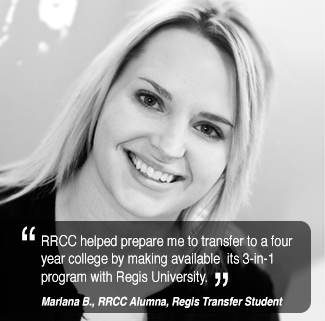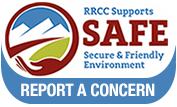Frequently Asked Questions
Frequently Asked Questions about Accreditation at Red Rocks Community College
- What is accreditation?
- Who are the regional accreditors and which states do they serve?
- Why is accreditation important?
- How is Red Rocks Community College accredited?
- Are all Red Rocks programs automatically accredited through the Higher Learning Commission?
- How does the HLC Open Pathway work?
- What are the most important areas from the Comprehensive Quality Review on which we need to continue to focus our improvement efforts?
- How does the Higher Learning Commission evaluate whether we should be reaffirmed for accreditation?
- What are the Assumed Practices and the HLC Criteria and Core Components?
- What does the Higher Learning Commission expect colleges to do about outcomes assessment?
- Is the Guaranteed Pathways (GT Pathways) program in Colorado equivalent to what HLC means by General Education?
What is accreditation?
- In the United States, accreditation is the primary process for assuring and improving the quality of higher education institutions. Regional accreditation traces its roots to 1885. However, it became a more integral part of higher education in 1952 with the reauthorization of the GI Bill®*, which covered the cost of tuition and living expenses for veterans of the Korean War.
- Accreditation of higher education institutions in the United States has traditionally been a peer review process, coordinated and regulated by member institutions (colleges, universities, etc.). The United States is divided into six geographic regions and for each there is a single regional accreditor. Each regional accreditor is responsible for accrediting the majority (if not all) of the public and private post-secondary education institutions located within the region.
*GI Bill® is a registered trademark of the U.S. Department of Veterans Affairs (VA). More information about education benefits offered by VA is available at the official U.S. government website at http://www.benefits.va.gov/gibill.
Who are the regional accreditors and which states do they serve?
- The regional accreditors include the following.
- Middle States Association of Colleges and Schools (New York, New Jersey, Pennsylvania, Delaware, Maryland, the District of Columbia, Puerto Rico, and the US Virgin Islands)
- New England Association of Schools and Colleges (Connecticut, Maine, Massachusetts, New Hampshire, Rhode Island, and Vermont)
- Higher Learning Commission (Arkansas, Arizona, Colorado, Iowa, Illinois, Indiana, Kansas, Michigan, Minnesota, Missouri, North Dakota, Nebraska, Ohio, Oklahoma, New Mexico, South Dakota, Wisconsin, West Virginia, and Wyoming)
- Northwest Commission on Colleges and Universities (Alaska, Idaho, Montana, Nevada, Oregon, Utah, and Washington)
- Western Association of Schools and Colleges (California, Hawaii, Guam, American Samoa, Micronesia, Palau, and Northern Marianas Islands)
- Southern Association of Colleges and Schools (Virginia, Florida, Georgia, Kentucky, Louisiana, Mississippi, North Carolina, South Carolina, Alabama, Tennessee, and Texas)
Why is accreditation important?
College accreditation is a guarantee that a college or program meets certain principles and provides quality education.
- It gives the assurance that you will be able to attain definite educational outcomes.
- It pledges that you'll get qualified instructors and high-quality up-to-date curriculum.
- Without accreditation by a recognized accredited organization, a school and its students are not eligible to participate in government student assistance programs like federal grants and loans.
- Most employers who offer tuition assistance will not reimburse your tuition if you attend a school that is not accredited.
- Most employers will look at a degree from an institution with accreditation as a credential demonstrating motivation and quality education.
- If you intend to transfer credits to another college, you are required to attend an accredited school.
How is Red Rocks Community College accredited?
The Higher Learning Commission (HLC) accredits Red Rocks Community College. HLC has three different pathways to accreditation. These are Candidate for Accreditation, the Standard Pathway, and the Open Pathway. Note that the former PEAQ pathway based on self-study, and the Academic Quality Improvement Program (AQIP) no longer exist. In 2003, RRCC voted to join the Academic Quality Improvement Program, a new reaccreditation and quality improvement process sponsored by the Higher Learning Commission. After successfully achieving re-affirmation of accreditation in 2018-19 under the AQIP Pathway, RRCC opted to follow the HLC Open Pathway.
Are all Red Rocks programs automatically accredited through the Open Pathway?
No. While accreditation at the institutional level is necessary, national entities also accredit some Red Rocks programs. These include the following:
- Childhood Education - The National Association accredits the Early Childhood Education program at Red Rocks Community College for the Education of Young Children (NAEYC).
- Emergency and Public Safety Programs - The Colorado Department of Public Health and Environment approves the Emergency Management Services Program at Red Rocks Community College. The Firefighter I Academy is approved through the Colorado Division of Fire Safety, and the Colorado Peace Officers Standards and Training Board (POST) approve the Law Enforcement Academy.
- The Red Rocks Community College Medical Assisting Certificate Program is accredited by the Commission on Accreditation of Allied Health Education Programs (www.caahep.org (link is external) (link is external)) upon the recommendation of MAERB. Our Medical Assisting AAS Degree meets all Colorado state accreditation requirements.
- Medical Imaging Program - The Red Rocks Community College Radiologic Technology Program is accredited by the Joint Review Committee on Education in Radiologic Technology (JRCERT)
- Nurse Aid - The Colorado State Board of Nursing (DORA) accredits Nurse Aid Program at Red Rocks Community College.
- Physician Assistant Program - he Accreditation Review Commission on Education for the Physician Assistant (ARC-PA) accredits the Red Rocks Community College Physician Assistant Program..
How does the HLC Open Pathway work?
The Open Pathway works on a ten-year cycle that has the following activities, documents, and reviews.
- An annual institutional report along with Substantive Change processes for new sites and programs. Institutions submit an annual Institutional Update, which HLC monitors to determine organizational health, compliance with certain federal requirements and identification of any changes that may require HLC follow up.
- Annual Assurance System Update - During each year of the cycle, institutions update the HLC Assurance System with data for an HLC review.
- Assurance Argument Development and Assurance Argument - RRCC will develop an Assurance Argument in Year 4 of the cycle. The Assurance Argument demonstrates how RRCC meets each HLC Criterion and Core Component. It is accompanied by an Evidence File to support the Argument.
- Quality Initiative Proposal - This part of the cycle begins in Year 5. The Open Pathway requires an institution to designate one major improvement effort it has undertaken during its 10-year accreditation cycle as its Quality Initiative. The Quality Initiative takes place between years 5 and 9 of the 10-year Open Pathway Cycle. The Quality Initiative project will begin and finished during this time, or as a continuation of a longer initiative.
- Quality Initiative Report - In Year 7, RRCC will begin to submit a Quality Initiative Report. The Quality Initiative Report details progress on the Quality Initiative that RRCC chooses to leverage quality improvement.
- Comprehensive Evaluation for Reaffirmation - At the end of the ten-year cycle, institutions undergo a Comprehensive Quality Review as part of a broader comprehensive evaluation to ensure they are meeting the Criteria for Accreditation, pursuing institutional improvement and complying with certain requirements set by the U.S. Department of Education. This review leads to an action regarding the reaffirmation of the institution’s accreditation. Our next Comprehensive Quality Review will take place in 2028-29.
What are the most important areas from the Comprehensive Quality Review on which we need to continue to focus our improvement efforts?
Five areas that are especially important.
- Systemic Assessment of Student Program Learning Outcomes;
- Systemic Assessment of Student Common Learning Outcomes (including Co-Curricular);
- Alignment of Student Learning and Support Needs with Planning and Budgeting;
- Alignment of College Quality Improvement and Governance with Planning and Budgeting;
- Documentation of assessment results and decision making for all the above.
How does the Higher Learning Commission evaluate whether we should be reaffirmed for accreditation?
The Higher Learning Commission accredits Open Pathway institutions using (1) Assumed Institutional Practices and (2) Criteria and Core Components for Accreditation. RRCC writes assurance arguments and provides supporting data to document that it is addressing and meeting the Criteria and Core Components.
What are the Assumed Practices and the HLC Criteria and Core Components?
The Assumed Practices are a checklist of minimum standards that are shared by all institutions of higher education in the United States. The Criteria and Core Components for Accreditation are also standards of quality but will vary somewhat by institutional mission or context. Taken together, they are the “What” by which HLC determines whether an institution merits accreditation. Each Criterion has Core Components. The five Criteria are below.
- Mission
- Integrity: Ethical and Responsible Conduct
- Teaching and Learning: Quality, Resources, and Support
- Teaching and Learning: Evaluation and Improvement
- Resources, Planning, and Institutional Effectiveness
Visit the Higher Learning Commission website for more information on Assumed Practices or the Criteria and Core Components under each Criterion.
What does the Higher Learning Commission expect colleges to do about outcomes assessment?
RRCC needs to answer the question “How do we know what we need to do to improve?” Assessment refers to how we answer that question – the inquiry methods, results, and decisions we make to determine if we have accomplished our desired outcomes. HLC expects us to “close the loop” among planning, assessment, and budgeting. The key to this is to document clear evidence that instruction, student success, and administrative units:
- Define desired outcomes;
- Have a consistent, ongoing process to review whether these outcomes are achieved;
- Act to continuously improve processes, especially through resource allocation.
While student learning outcomes are at the heart of our Mission, not all unit outcomes are directly about student learning. Student success also sets outcomes for student development. Administrative and business services outcomes create and maintain effective physical, technological, and fiscal learning environments for the college.
Is the Guaranteed Pathways (GT Pathways) program in Colorado equivalent to what HLC means by General Education?
No. GT Pathways is a series of articulation agreements for approved transfer courses to four-year Colorado institutions. General education refers to the specific Common Learning Outcomes we want all RRCC students to learn by the time they complete their certificate or degree. HLC Criteria specify that the general education program of a college should be appropriate to the Mission, have intended student learning outcomes which are assessed, and imparts broad knowledge, intellectual concepts, and skills and attitudes that the institution believes every college-educated person should possess. General Education is the educational foundation that prepares students for success in their major program, and in their career and personal lives after graduation.










